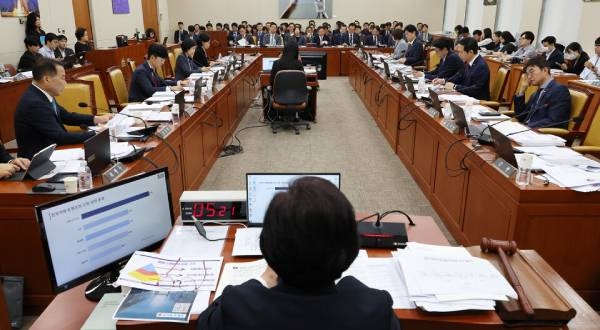The Artificial Intelligence (AI) Act, which was scrapped in the 21st Diet session, was passed by a subcommittee of the Standing Committee nearly six months after the 22nd Diet convened.
With the ruling and opposition parties reaching agreement on key issues in the law, there is growing optimism that the law will be enacted by the end of 2024.
The National Assembly Science, ICT, Broadcasting and Communications Committee on Thursday approved 19 AI-related legislative proposals submitted by both parties through integrated review.
A key feature of the approved bill is a shift to a risk-based regulatory approach, with the exception of the “prohibited AI” provisions. Instead, the bill would impose new responsibilities on companies that work with “high-impact AI,” which is considered riskier than general AI.
The concept of “high-impact AI”, first proposed by Rep. Lee Hae-min of the Korea Reconstruction Party, refers to AI that has the potential to have a significant impact on human life, physical and mental health, safety, fundamental rights, national security, or public welfare. Refers to an AI system with
The purpose of this law is to classify technologies that directly affect human life, and for the government to require companies to ensure their reliability and safety.
The industry has previously called for a clearer definition of high-impact AI to prevent unnecessary regulatory burden. Reflecting these demands, the bill would allow companies to request confirmation from the Ministry of Science, Information and Communications to determine whether their AI technology falls under the category of high-impact AI.
The law also provides grounds for imposing fines on companies that fail to comply with notification requirements regarding high-impact AI. The AI Act also requires global AI technology companies, such as OpenAI, operating in South Korea to appoint a national representative to liaise with the government.
Additionally, AI-generated images and videos must include watermarks.
The AI Act has received positive feedback for its ability to balance liability with measures to promote the AI industry.
In addition to requiring the government to formulate an AI promotion plan, the bill also includes provisions that would allow for the establishment of AI safety institutes, AI associations, etc. It also outlines investments in AI data centers, regional development, and support for startup ventures.
The subcommittee passed the abolition of the Mobile Device Distribution Development Act and amendments to the Telecommunications Business Act without any objections.
The bill to abolish the Mobile Device Distribution Act is expected to be passed smoothly at the plenary session of the National Diet, with support from both the ruling and opposition parties.
The integrated bill, which combines proposals from Rep. Park Chung-kwon of the People’s Power Party and Rep. Kim Hyun of the Democratic Party, abolishes the Device Distribution Act and abolishes the public subsidy system.
This proposal transfers the voluntary contract discount system, which provides a 25% discount on service charges, to the Telecommunications Business Law, with the aim of ensuring consumer welfare.
However, the provision prohibiting discriminatory subsidies, which was the core of the Democratic Party’s proposal, was excluded.
This provision was intended to prevent telecommunications companies from offering unfairly differentiated subsidies based on subscription type, service plan, or region of residence.
Written by Kim Dae-gi, Koo Jeong-geun, Lee Eun-joo
(ⓒMainichi Economic News Korea and mk.co.kr pulse, all rights reserved)



